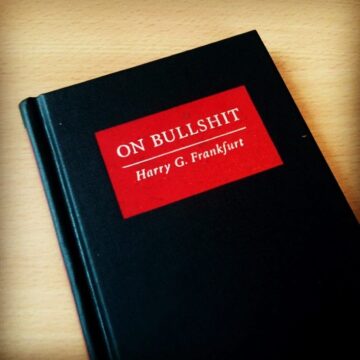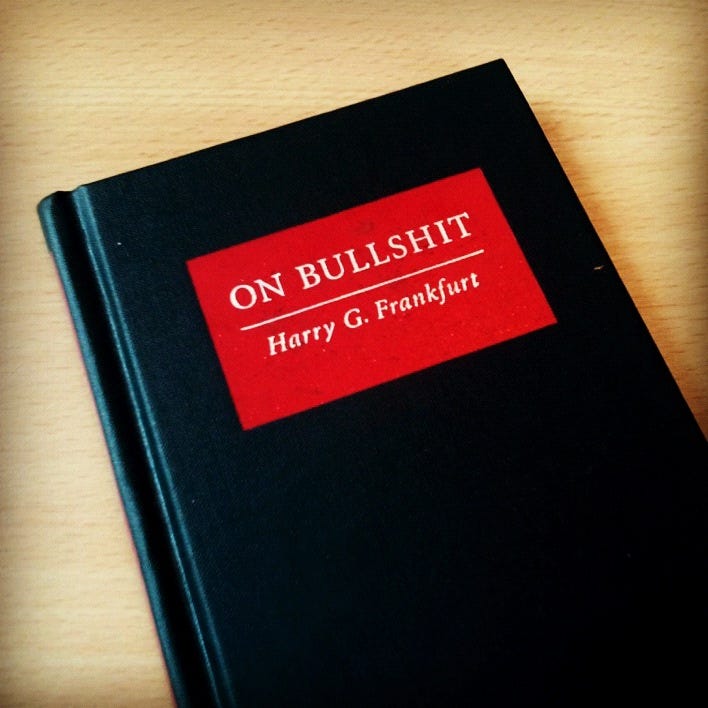by Laurence Peterson
 When I started as a Monday columnist at 3 Quarks Daily in July of last year, my debut piece consisted of an updated and revised version of a longer, never published essay I had written pretty much at the time the late Princeton Professor Harry Frankfurt’s On Bullshit appeared in book form in 2005. Back then, literary references to bullshit almost always took on a still cheeky, irreverent undertone at the very least, and I adopted the sentiment in the beginning and conclusion of my 3QD contribution. But now, I will suggest, bullshit is serious business.
When I started as a Monday columnist at 3 Quarks Daily in July of last year, my debut piece consisted of an updated and revised version of a longer, never published essay I had written pretty much at the time the late Princeton Professor Harry Frankfurt’s On Bullshit appeared in book form in 2005. Back then, literary references to bullshit almost always took on a still cheeky, irreverent undertone at the very least, and I adopted the sentiment in the beginning and conclusion of my 3QD contribution. But now, I will suggest, bullshit is serious business.
Before I elaborate on that claim, allow me to, as concisely as I can, summarize the argument I put forth in the July article. Frankfurt made the case that the essence of bullshit involved, more than anything else, a distinction between bullshit and lying: that the bullshitter, unlike the liar, does not misrepresent the truth; s/he merely adopts an attitude of indifference towards it. Clearly, this definition allows us to appreciate the vast latitude that allows the bullshitter to, if you will allow me to use a word that has become fashionable in certain circles recently, “weave” between layers of reality (and, of course unreality) in a far less restricted way than is generally afforded the potential liar. But from the moment I read Frankfurt’s essay, I thought his definition left something utterly essential out of a proper conception of bullshit, something whose incorporation into discussions of the notion of bullshit would go a long way towards accounting for the visceral emotional states that tend to accompany its appearance in ordinary usage. And it would confront something Frankfurt didn’t even seem to believe constituted a problem, namely, what the phenomenon of bullshit revealed about social relations in which employing bullshit often made so much sense.
What I thought Frankfurt was missing was, going beyond the mere intention of the bullshitter, a place for a sentiment on the part of those subjected to bullshit that no effective means exist to challenge the statement, implied proposition or even deed being expressed, put forward, implied, relied upon, or whatever by the bullshitter. Inclusion of this place in the account would, in turn, shed light on the social relations in which lack of means to such challenges can be enforced in the first place. It would also account for the unique sense of frustration, and even rage that characterizes the experience of being, or at least feeling, bullshitted. Frankfurt’s definition didn’t seem to me to imply or address any of these things in an important way. Yet it remained, as far as I could see, the sole, almost canonical reference in literary and philosophical discussions of bullshit, even after twenty years.
And what a twenty years! I suppose the face of bullshit back then was George W. Bush, telling preposterous falsehoods with a smirk on his face, knowing he would always get away with it, and never be seriously challenged. In those days, at least, we could have a laugh in public at W’s expense. Now we have Trump, and we have to adopt whispers in public at the mention of his name, or when we encounter the transparent propaganda of the genocidal Israeli Defense Forces, meaningful resistance to which can result in expulsion from jobs or university in many western countries, or in any number of instances in which, nowadays, we are being actively deprived of customary access to the means of challenging what we find viscerally offensive, or even repulsive, in the public sphere. In July, I described the essence of bullshit as follows:
“…we are forced to walk away from situations we find somehow unsatisfactory without enjoying recourse to any more developed discursive or more binding devices to tease or tear out of the statement, deed or outcome, more acceptable ones, or simply a better explanation why we must ultimately submit in the first place. Indeed, it is worse than this: we feel that these means are, to a not insignificant degree, already available; and that we must submit precisely on occasions when clear-cut conventions or rules should automatically generate objections from the wider community of listeners or witnesses surrounding us. It is this visceral sense of casually enforced rules and subsequent illegitimate isolation from a community who, according to their own publicized standards of behavior and communication, would seem to be committed to an enthusiastic hearing of our objections, that seems to characterize bullshit and take it out of the realm of normal discourse and provide it with the emotional power that has always been the wellspring of the profane.”
Right now I want to try to go beyond this. I would now add to my conception of bullshit a requirement that the kind of challenge effectively being denied the bullshitted involves an implicit appeal across some imagined social or cultural barrier; that the bullshitted is so confident in her/his objection to the bullshitter that the bullshitted genuinely feels that even someone from a totally different or even opposing social group would be forced to submit upon hearing, seeing or encountering the objection. Thus, to account fully for the phenomenon of bullshit, we require a conception that envisions the bullshitted to expect that someone completely unlike him or her in essential social ways, perhaps even the bullshitter her/himself, will admit the objections the bullshitted would raise, if s/he were allowed effective access to socially recognized means of objection.
Why is this so important now? I would argue that it is precisely this kind of conceptual input into our everyday notion of bullshit that is being so rapidly and thoroughly corroded in the current political and social environment. As a result, we are being conditioned in a way that we no longer even try to imagine what might constitute thinking in ways that might be opposite to our views, if only vigorously to refute them. We are, thereby, losing a capacity to, like no other in our society, perhaps, resist the things that offend us the most. Bullshit, in other words, and in important respects, may be becoming obsolete.
***
Enjoying the content on 3QD? Help keep us going by donating now.

